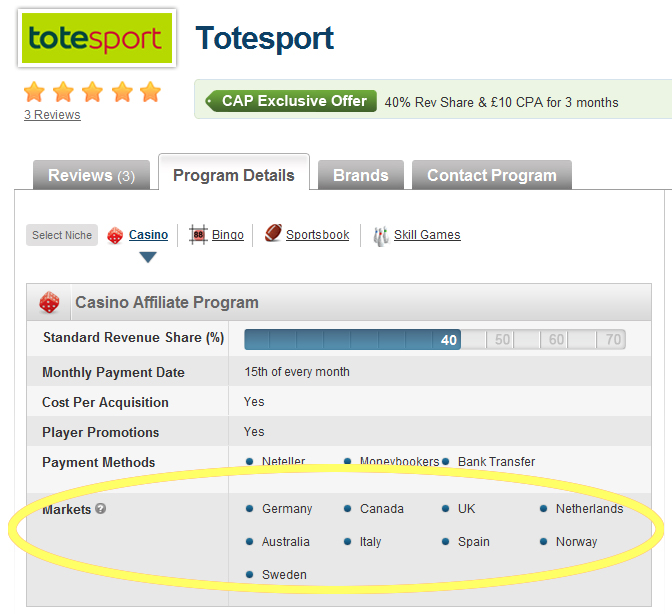Diversify, diversify, diversify: That’s been the resounding lesson from the experts, particularly in the U.S., where we in the poker industry have had to stand by and watch our livelihood being attacked by government agents.
As we mentioned Wednesday, a major factor in diversification is focusing on non-U.S. traffic.
“As U.S. affiliates, it’s easy to say ‘let’s diversify’ and start sending players to UK rooms and [other] markets,” poker affiliate pro Jeremy Enke recently told CAP, explaining that sites that rank high in U.S. search engines tend to rank high in UK and European searches, too.
So, if you’re frustrated at the sudden lack of U.S. conversions you’re able to achieve, think about leveraging your existing SEO and marketing strength in other markets. The UK is the obvious choice; online gambling there is extremely well regulated, and many leading casino affiliate programs are based in London anyway.
Alternate global igaming markets: Regulated
The UK. The UK is the global leader in online gambling regulations. They did it early, and they did it carefully. Online gambling brands like 888, William Hill, and PartyGaming (now part of Bwin.Party, of course) are licensed, legal, and closely watched on the London Stock Exchange.
France. France is newly regulated, and the focus of a lot of online gambling anticipation. Many major UK-facing brands have entered that market, and are available for licensed gambling sign-ups in France.
Ireland. Ireland is, like the UK, an online gambling hub. Home to Paddy Power and other hip brands, the Irish bingo and betting markets are particularly bustling.
Italy. Italy’s in the birth pangs of regulated online gambling, with licensing underway. The market here has yet to mature, but that could be a good thing for affiliates looking to get in on the ground floor. It’s also considered to be Europe’s biggest online gambling market.
Alternate global igaming markets: Unregulated
Australia. Australia’s got a billion-dollar-a-year online gambling spend, but lately, government officials have been hinting (actually shouting) that they want to stop it. Currently, the Aussie market is similar to the U.S., pre-Black Friday. Given recent reports that the Australian government is cooperating with the FBI on online gambling crackdowns, this may not be the best option for those looking for more stability than what the U.S. currently offers.
Mexico. Mexico is, by most estimates, the biggest Spanish-speaking online gaming market. It’s hard to get accurate numbers on that, but whatever the case, Mexico is certainly the Latin American country most available to existing casino affiliate programs (and CAP Listed Programs).
Asia and India. Asia is largely unregulated, but anti-online gambling laws are enforced much more strictly than in places like the U.S. or Australia. Read CAP’s latest online gambling regulatory update for Asia here.
 Canada: The middle ground. Canada presents a unique situation: It’s regulated and unregulated. Provinces like British Columbia offer a regulated system of government-run online gambling, but many other UK and international brands operate there on an unlicensed basis, just as in the U.S. or Australia. But, like the U.S. and Oz, Canadian government officials are starting to realize how much more money they’d be making if online gambling was better regulated — and taxed.
Canada: The middle ground. Canada presents a unique situation: It’s regulated and unregulated. Provinces like British Columbia offer a regulated system of government-run online gambling, but many other UK and international brands operate there on an unlicensed basis, just as in the U.S. or Australia. But, like the U.S. and Oz, Canadian government officials are starting to realize how much more money they’d be making if online gambling was better regulated — and taxed.
Get translating!
At this point, the only thing stopping you from branching into new markets is your ambition, and possibly your ability to translate content. To get started, head over to the CAP Listed Programs page, where each casino affiliate program describes where it can be marketed.